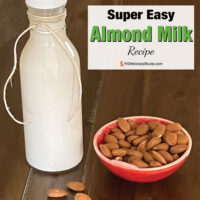
Multiple sclerosis (MS) is a chronic autoimmune disease affecting the central nervous system. While diet alone cannot “cure” MS, an anti-inflammatory diet can help. Eating anti-inflammatory foods lowers inflammation and has the power to reverse symptoms.
In 2004, I changed my diet to a healthier one to help manage my MS. It happened one week before Thanksgiving, which, I’ll admit, was hard and depressing. Back then, there wasn’t a lot of information on the internet. Moreover, the “gluten-free” trend hadn’t yet gained popularity, limiting my grocery store options. Even though it was hard, it was fear of another MS flare that kept me going.
Eating an Anti-inflammatory Diet

Image by pvproductions on Freepik
MS overburdens your body with environmental toxins. A 20-year study found Epstein-Barr virus (EBV) is the main cause of MS. However, EBV is not the only factor.
Possible triggers for MS include:
- Poor Diet
- Infections (bacteria, parasites, viruses, and yeast overgrowth)
- Environmental toxins (heavy metals, mold, pesticides, etc.)
- Chronic stress
- Hormones (adrenaline, cortisol, etc.)
An anti-inflammatory diet can relieve all of these factors. Switching to an anti-inflammatory diet from a typical Western diet can be hard. But it is possible with gradual changes. Start by adding more whole foods like fruits, vegetables, nuts, and seeds. Reduce processed foods, sugar, and refined carbohydrates. Small steps can lead to big improvements over time.
Eventually, you should stop eating these foods:
- Dairy
- Gluten
- Refined sugar
- Artificial flavors and sweeteners
- Natural flavors
- Corn (it’s mostly a GMO)
- Soy (it’s mostly a GMO)
- MSG (harms the brain and central nervous system)
- Nutritional yeast (it’s has MSG in it)
- Canola oil (it’s mostly a GMO)
- Pork (it’s high in fat and prone to parasites)
- Farmed fish (it’s washed in toxic chemicals due to parasites)
- Processed citric acid (it’s mostly derived from corn)
- Peanuts (a common allergen)
- Eggs – both Dr. McDougall (McDougall Diet) and Dr. Wahls (The Wahls Protocol) recommend avoiding eggs
Considered healthy, these foods don’t aid the body in detoxification. It’s best to avoid or rarely eat these to help your body heal quicker. You can add these back after your body has healed.
Foods to avoid temporarily:
- Beans
- Chickpeas
- Lentils
- Gluten-free grains (e.g. mullet, quinoa)
What You Can Eat

Image by Freepik
You may be wondering what you can eat. Fortunately, there are lots of delicious foods you can eat. Whole plant foods are your main choice. You don’t need to be a vegetarian but your animal meats must also be healthy.
Dive into the goodness of anti-inflammatory foods. Include colorful veggies, fruits, and all the good stuff that heals your body. Toss in some herbs and spices into your recipes, spice things up, and let the power of anti-inflammatory foods do their magic.
Foods you can eat:
- Fruits
- Vegetables
- Herbs and spices
- Nuts and seeds
- Healthy oils such as coconut oil and olive oil
- Wild-caught fish
- Pasture-raised poultry
- Grass-fed and finished meats (e.g. beef, lamb, rabbit)
An anti-inflammatory diet doesn’t mean only eating salads. While salads with leafy greens are great, you can also enjoy many foods. It’s about balance and eating variety to get the most nutrients.
Here are some dinner samples:
- Grilled Chicken Salad:
– Grilled chicken breast seasoned with herbs.
– Mixed green salad with cherry tomatoes, cucumbers, and a vinaigrette dressing.
– Sliced almonds for added crunch.
2. Salmon with Steamed Broccoli and Cauliflower Mash:
– Baked or grilled salmon fillet with lemon and dill.
– Steamed broccoli.
– Mashed cauliflower with garlic and olive oil.
3. Beef Stir-Fry with Vegetables:
– Sliced lean beef stir-fried with colorful vegetables like bell peppers and carrots.
– Seasoned with ginger, garlic, and pineapple juice.
4. Eggplant with Tomatoes and Basil:
– Eggplant cooked in a tomato-based sauce with basil and coconut milk.
– Served with a side of sautéed spinach.
5. Turkey and Sweet Potato Hash:
– Ground turkey cooked with sweet potatoes, bell peppers, and onions.
– Seasoned with cumin, paprika, and a touch of cinnamon.
Fill your plate with mostly vegetables. Feel free to customize these ideas based on your taste preferences. Keep it simple there’s no need for a fancy meal – just throw together a loaded salad with some leafy greens, berries, and a sprinkle of walnuts for a quick boost from the power of anti-inflammatory foods.
Ditch the Soda

Image by KamranAydinov on Freepik
When it comes to beverages, filtered water is your best option. City water has disinfectants, fluoride, herbicides, lead, and mercury. Filtered water removes contaminants from the water.
Yes, well water is free of chemicals found in city water but it may have contaminants too. If you have a well you should have it tested periodically. Drinking well water could have bacteria or chemicals due to runoff from a nearby farm.
If you don’t like plain water try:
- Berry Smoothies. Blend wild blueberries and strawberries with non-dairy milk for a tasty, anti-inflammatory drink. Or try my delicious Kiwi Berry Smoothie.
- Coconut Water. Coconut water, rich in electrolytes, is a naturally sweet hydrating choice.
- Herbal Teas. Chamomile, peppermint, ginger, and turmeric teas have known potential for anti-inflammatory properties. Here’s one of my favorite herbal teas: Detox by Yogi.
- Turmeric Latte. Warm non-dairy milk with a dash of turmeric, ginger, and cinnamon can be a comforting drink. Click here for an easy recipe: Golden Spice Turmeric Latte.
- Vegetable Juice. Vegetable juices, freshly squeezed from celery, cucumber, and leafy greens, can be nutrient-rich.
- Water with Lemon. Refreshing and hydrating, lemon water adds flavor without extra sugars.
Hydration is crucial! Dehydration can worsen MS symptoms like fatigue and muscle spasms. Proper hydration helps maintain overall health plus it helps flush out toxins. Drink eight glasses of water per day. If you struggle with bladder issues start drinking first thing in the morning. As it gets closer to bedtime reduce drinking so you won’t be up all night.
Benefits of drinking water:
- Helps prevent urinary tract infections (UTIs)
- Improves sleep quality
- Removes toxins in the body
- Reduces inflammation
Drinking water supports bodily functions, contributing to a better quality of life. For a variety try drinking flavored water by adding fruits or vegetables. Herbal tea is another option, you can drink it hot or cold. This is one of my favorite herbal teas: Detox by Yogi.
Improve Your Quality of Life

Image by benzoix on Freepik
Alcohol:
It’s best to avoid alcohol altogether. Alcohol can cause a person to lose their balance and coordination, it increases urinary urgency and frequency, and it impairs decision-making and memory. All of these are symptoms of MS and drinking alcohol magnifies it. Have you ever seen the “I’m not drunk, I have MS” t-shirts?
Exercise:
Years ago, doctors recommended people with MS to not exercise. But, if you don’t exercise, you WILL get stiffness, muscle weakness, and fatigue. Today, doctors know that regular exercise is important for maintaining mobility, and strength, and managing MS symptoms. My favorite is OptimalBody Personal Fitness. It’s an online gym for people with MS, the owner also has MS so he knows from experience which exercises work.
Sleep:
Get enough restful sleep. Unfortunately, in today’s society, many people struggle with sleep issues. Whether it’s falling asleep or waking up in the middle of the night and not being able to get back to sleep. There is so much coming at us that it keeps our brain active making it harder to sleep.
Living with MS can make it hard to get a good night’s sleep. Symptoms such as pain, leg cramps, or urinary issues don’t help. Some DMTs can disturb sleep. And to top it off, lack of sleep can make MS symptoms worse.
Tips for getting a good night’s sleep:
- Exercise earlier in the day
- Get daily exposure to sunlight
- Keep the TV out of your bedroom
- Make the temperature in your bedroom comfortable
- Reduce stress before bedtime
- Stay off your electronic devices an hour before bedtime
- Try relaxation techniques like deep breathing or gentle stretching before bed
Smoking:
If you smoke – quit! Smoking is linked with MS and it can make your MS worse. Plus, if you are on one of the disease-modifying therapies (DMTs) smoking makes it less effective. Smoking is highly addictive so it can be hard to quit, for help visit smokefree.gov or call 800-QUITNOW (800-784-8669).
Stress:
Stress can worsen MS symptoms and cause a relapse. It impacts every part of your body including your mind. It’s extremely important to make your life less stressful. Stress that’s not dealt with can lead to MS flare and many other health problems, such as high blood pressure, heart disease, stroke, obesity, and diabetes.
Ways to reduce stress:
- Avoid toxic people
- Change your mindset
- Connect with others
- Exercise
- Get a massage
- Get your finances under control
- Go for a walk
- Listen to your favorite music
- Meditate
- Play with your kids or dog
- Quit watching the news
- Spend time in nature
- Stay off of social media
- Stretching
- Take deep breaths
- Watch a funny movie
The Power of Anti-Inflammatory Foods

Image by gpointstudio on Freepik
Use the power of anti-inflammatory foods to heal your body. These aren’t just ingredients; they’re the beginning of a healthier life. From leafy greens to berries, every bite becomes a choice for reducing inflammation and improving your health. This is not a diet; it’s a healthy lifestyle for the better.
The food you eat can be either the safest and most powerful form of medicine or the slowest form of poison.
– Ann Wigmore

The Ultimate Guide to Surviving & Thriving with MS
Unlock the key to a vibrant life with multiple sclerosis by subscribing to my newsletter and gaining exclusive access to The Ultimate Guide to Surviving & Thriving with MS. It’s packed with valuable information on natural management strategies and clean health lifestyle practices that you can start today.
Want to remember this health tip? Pin it to your Pinterest board!

Image by Freepik
The Power of Anti-Inflammatory Foods





